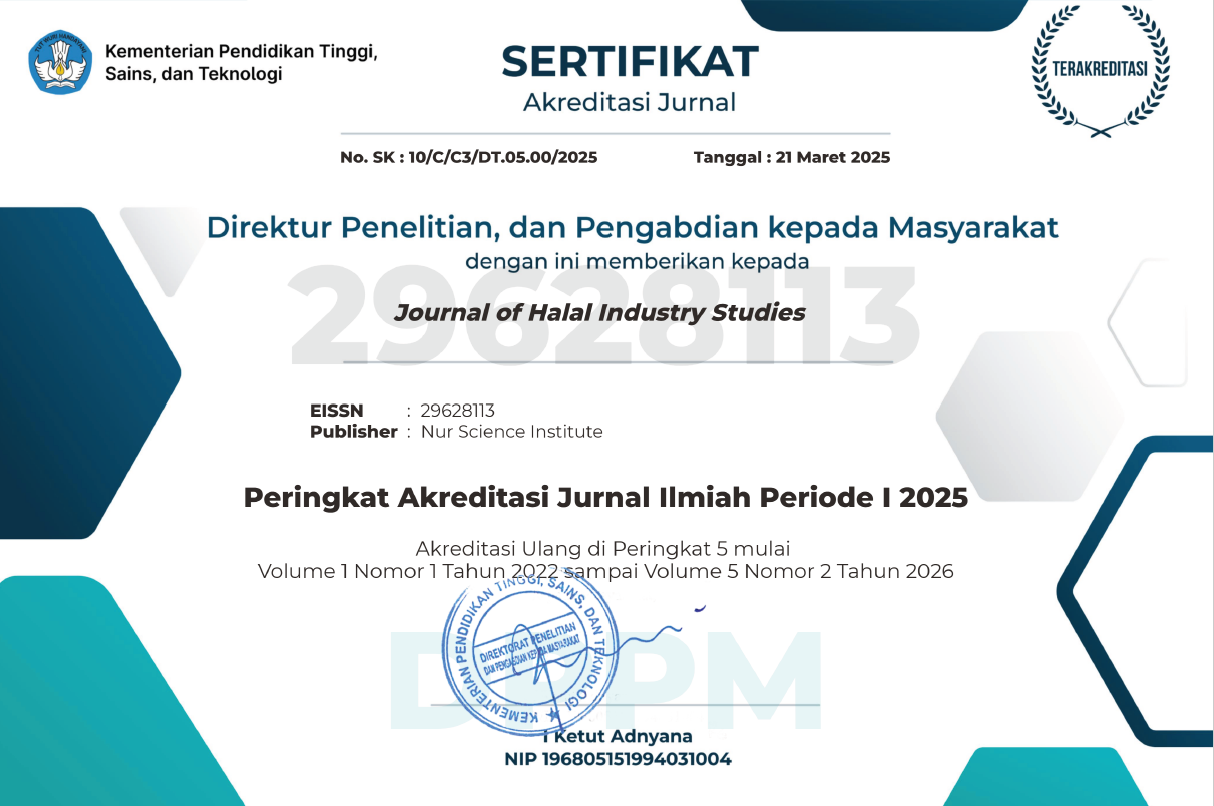Analisa keberhasilan produk pakaian asal Jepang: Eksistensi brand Uniqlo di Indonesia
DOI:
https://doi.org/10.53088/jhis.v2i2.562Keywords:
Industri Halal, UNIQLO, Busana Muslim Friendly, Strategi, Jepang, Pasar IndonesiaAbstract
The halal industry is a sector that has developed very rapidly. Its development was followed by an increasingly advanced era of globalization so that its existence can be recognized by the whole world. Opportunities that the halal industry gets are not only in Muslim countries, but non-Muslim countries are also taking part in getting these benefits and attention. Japan is a non-Muslim majority country, Japan is doing business by expanding to Indonesia which aims to penetrate the Indonesian market. The research method carried out by researchers is by means of library research and qualitative methods with secondary data. Where in this study using data originating from literature and supported by some secondary data. The results and the conditions explained by the researchers are related to the strategy carried out by Japan with the UNIQLO brand in providing Muslim-friendly clothing. In penetrating the market and its existence, Japan and UNIQLO have used many ways to attract the attention of the Indonesian people. The strategy in penetrating the Indonesian market carried out by Japan is by bringing the Cool Japan concept and the strategy in penetrating Muslim communities with Muslim friendly clothing is by collaborating with well-known designer Hana Tajima.
References
Arindaputri, N. B., & Santoso, S. (2023). Analysis of the influence of digital marketing, brand image, and price perception on purchase intention and brand loyalty in UNIQLO apparel products. International Journal of Research in Business and Social Science (2147- 4478), 12(4), 57–65. https://doi.org/10.20525/ijrbs.v12i4.2612
Astuti, M. (2020). Pengembangan Produk Halal Dalam Memenuhi Gaya Hidup Halal (Halal Lifestyle). Iuris Studia: Jurnal Kajian Hukum, 1(1), 14–20. https://doi.org/10.55357/is.v1i1.16
DinarStandard. (2019). State of the Global Islamic Economy Report 2019.
Fathoni, M. A. (2020). Potret Industri Halal Indonesia: Peluang dan Tantangan. Jurnal Ilmiah Ekonomi Islam, 6(3), 428. https://doi.org/10.29040/jiei.v6i3.1146
Fuadi, Soemitra, A., & Nawawi, Z. M. (2022). Studi Literatur Implementasi Sertifikasi Halal Produk UMKM. Jurnal EMT KITA, 6(1), 118–125. https://doi.org/10.35870/emt.v6i1.541
Hamidah, I. N., & Prabowo, B. (2023). The Influence Of Brand Image, Perceived Quality, And Consumer Attitudes On UNIQLO Brand Equity (Study On UPN Veteran Students, East Java) Merek UNIQLO (Studi Pada Mahasiswa UPN Veteran Jawa Timur). Management Studies and Entrepreneurship Journal, 4(4), 3762–3772. http://journal.yrpipku.com/index.php/msej
Kusuma, S. S., Wijayanto, A., & Listyorini, S. (2022). Pengaruh Brand Image, Kualitas Produk dan Harga terhadap Keputusan Pembelian pada Merek UNIQLO (Studi pada Konsumen UNIQLO Dp Mall Semarang). Jurnal Ilmu Administrasi Bisnis, 11(4), 807–813. https://doi.org/10.14710/jiab.2022.35892
Nasution, L. Z. (2020). Penguatan Industri Halal bagi Daya Saing Wilayah: Tantangan dan Agenda Kebijakan. Journal of Regional Economics Indonesia, 1(2), 33–57. https://doi.org/10.26905/jrei.v1i2.5437
Radwan, M., Kamal, M., Khavarinezhad, S., & Calandra, D. (2020). Influencing Factors on Modest Fashion Market: A Case Study. International Journal of Applied Research in Management and Economics, 2(1), 12–22. https://doi.org/10.33422/ijarme.v2i1.208
Sari, C. R., & Hidayat, A. M. (2021). The Influence of Influencer Marketing and Product Quality on Purchasing Decisions at UNIQLO Telkom University. E-Proceeding of Management, 8(2), 1361–1368. https://openlibrarypublications.telkomuniversity.ac.id/index.php/management/article/viewFile/14809/14586
Satriana, E. D., & Faridah, H. D. (2018). Wisata halal: perkembangan, peluang, dan tantangan. Journal of Halal Product and Research (JHPR), 01(02), 32–43.
Soesilopranoto, K. S. (2019). Pengaruh Brand Awareness, Perceived Quality Dan Brand Personality Terhadap Brand Loyalty UNIQLO Di Surabaya. Journal of Chemical Information and Modeling, Vol 6(2), 10.
Tan, X., & He, Y. (2019). Research on Marketing Modes of New Retail Based on 4C Principles: a Case Study of UNIQLO. International Conference on Economy, Judicature, Administration and Humanitarian Projects, 94(Jahp), 944–950. https://doi.org/10.2991/jahp-19.2019.191
Wang, L. (2019). Analysis on 5W Mode of UNIQLO Brand Communication in the Era of New Media. International Conference on Contemporary Education, Social Sciences and Ecological Studies, 356(Cesses), 638–642. https://doi.org/10.2991/cesses-19.2019.144
Wardoyo, S. (2019). Strategi Dagang Dan Permasalahan Toko Jepang Di Hindia Belanda Sebelum Perang Dunia II. Izumi, 8(1), 38. https://doi.org/10.14710/izumi.8.1.38-51
Zulfatun Ni’mah, Mahmud Arif, Chanif Ainun Naim, & Rahmatullah. (2022). The Role of the Fashion Industry and Muslim Celebgrams in Constructing Contemporary Muslim Fashion Trends among Female Students. DINIKA : Academic Journal of Islamic Studies, 7(2), 277–308. https://doi.org/10.22515/dinika.v7i2.6496
Zulyanto, A. (2016). Kesiapan Dalam Menghadapi Era Perdagangan Bebas Masyarakat Ekonomi Asean (MEA). Ekspansi, 8(1), 29–45.
Downloads
Published
How to Cite
Issue
Section
License
Copyright (c) 2023 Nasya Faza Cahya Shifra

This work is licensed under a Creative Commons Attribution-ShareAlike 4.0 International License.
Authors who publish with this journal agree to the following terms:
The author(s) retain copyright and grant the journal the right of first publication with the work simultaneously licensed under a CC BY-SA 4.0 license that allows others to remix, adapt, and build upon the work even for commercial purposes, as long as they credit the author(s) and license their new creations under the identical terms.
License details: https://creativecommons.org/licenses/by-sa/4.0/


